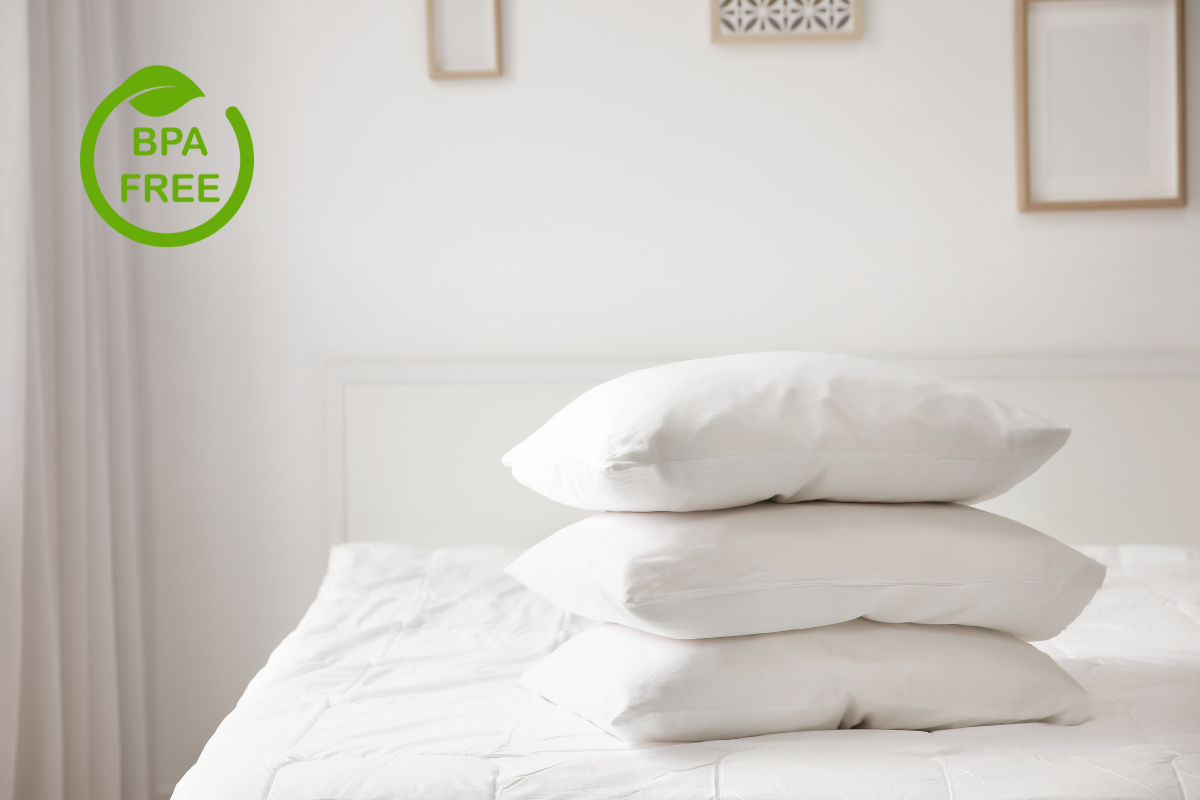If you've shopped for anything from water bottles to food containers - or even bedding - you’ve probably seen the term “BPA-free.” But what exactly does BPA-free mean, why is it important, and how does it relate to the materials you use in your bedroom? In this guide, we’ll break down everything you need to know about BPA, BPA-free products, and how choosing safer materials can impact your health and overall well-being.
What Is BPA?
BPA stands for Bisphenol A, a synthetic compound that has been used in the production of plastics and resins since the 1960s. You’ll find BPA commonly in:
-
Plastic water bottles
-
Food containers
-
Canned food linings
-
Receipts
-
Certain types of polyester and synthetic fabrics
The issue with BPA is that it’s a hormone-disrupting chemical that can leach into food, water, and even be absorbed through the skin. Studies have linked BPA exposure to potential health concerns such as hormonal imbalance, reproductive issues, cardiovascular disease, and developmental problems in children.
What Does BPA-Free Mean?
When a product is labelled BPA-free, it simply means that BPA has not been used in its production. Instead, the materials used are either natural, non-toxic, or made from plastics that do not contain BPA or similar harmful chemicals.
While this term is most commonly associated with food-safe plastics, it’s increasingly relevant in textiles, especially those used in bedding and sleep accessories, where your skin is in close contact with the materials for hours each night.
Why Is BPA-Free Important?
1. Health and Safety
The primary reason to choose BPA-free products is health. BPA mimics estrogen in the body and can interfere with the natural balance of hormones, potentially leading to health issues. BPA-free materials reduce the risk of:
-
Hormonal disruptions
-
Skin irritation
-
Allergic reactions
-
Long-term exposure to toxins while sleeping
2. Skin Sensitivity
If you have sensitive skin or allergies, sleeping on bedding that contains synthetic materials with chemical residues can trigger breakouts or irritation. BPA-free bedding materials are typically gentler and more breathable, making them ideal for people with eczema or skin concerns.
3. Eco-Conscious Living
Most BPA-free materials are also more environmentally friendly. Natural fibres like organic cotton, bamboo, and TENCEL™ are not only BPA-free but biodegradable and sustainably produced.
BPA-Free Bedding: What Should You Look For?
Though BPA is mainly a concern with hard plastics, some synthetic bedding materials can contain chemical residues from processing - particularly in polyester, microfiber, and other petroleum-based textiles.
To ensure your sleep environment is as clean and healthy as possible, choose BPA-free bedding made from natural, certified materials. Here’s what to look for:
-
TENCEL™ Lyocell: Made from sustainably sourced eucalyptus wood pulp, this material is BPA-free, breathable, and resistant to bacteria and allergens.
-
Organic Bamboo Viscose: A naturally soft and chemical-free material that’s ideal for sensitive skin.
-
GOTS-Certified Organic Cotton: Free from harmful chemicals and responsibly produced.
-
Certifications: Look for OEKO-TEX® Standard 100 or GOTS (Global Organic Textile Standard), which guarantee the absence of toxic chemicals, including BPA.
Ethical Bedding’s Commitment to BPA-Free
At Ethical Bedding, we are committed to ensuring all our products are toxin-free, hypoallergenic, and gentle on the planet. Our bedding collections, including our Luxury Bamboo Sheets, TENCEL™ duvets, and pillows, are crafted from BPA-free materials and produced using sustainable, low-impact processes.
Explore our toxin-free, hypoallergenic bedding collections →
Common Questions About BPA-Free
Is BPA only found in plastics?
While BPA is most commonly associated with plastics, it can also be found in synthetic resins and coatings - sometimes used in textiles and household items. That’s why it’s important to pay attention to what materials your bedding is made from, not just your kitchenware.
Are all bamboo or cotton sheets BPA-free?
Not always. Conventional cotton and low-quality bamboo blends may still contain chemical residues from bleaching or finishing processes. Look for certified organic or sustainably produced materials to ensure they’re genuinely BPA-free.
Can BPA be absorbed through the skin while sleeping?
Yes, particularly when you're sweating at night. Long-term exposure to BPA-containing materials in bedding may increase the likelihood of it entering your body through the skin. Opting for BPA-free, natural fibres reduces this risk.
Final Thoughts: Sleep Clean, Live Clean
Choosing BPA-free materials isn’t just about avoiding a single chemical. It’s about creating a healthier, more conscious lifestyle, starting with the place you spend a third of your life - your bed.
By opting for BPA-free bedding like the collections at Ethical Bedding, you reduce your exposure to harmful toxins, protect your skin, and support sustainable manufacturing.








Share:
What Is a Pillow Protector & Why You Definitely Need One
Say Goodbye to Sheet Pilling: Why It Happens and How Eucalyptus Sheets Help Prevent It